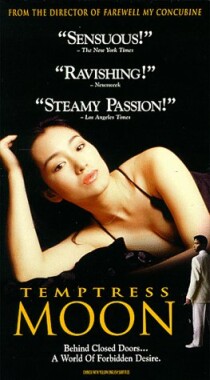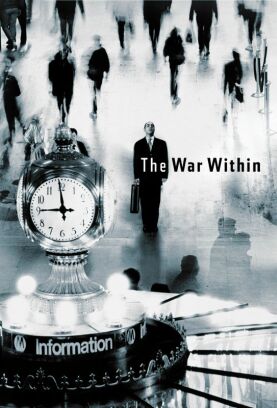Temptress Moon (Feng yue)
It’s nice to know, as
I’m sure
I’ve said before, that somewhere in
the world life on celluloid is still an earnest business and not a sly,
postmodern in-joke as it has so largely become in the pampered West. You might
have to go to China, however, still not recovered from nearly 50 years of
communism, to find it. Unfortunately, there is more to life than earnestness,
and Temptress Moon by Chen Kaige (whose previous film was Farewell My
Concubine) is overwrought and intense and melodramatic in a way that it is
very hard for an American audience of the 1990s to feel comfortable with. We
haven’t seen such stuff since the
1950s, and we have been laughing at it more or less ever since. Still, it is
very much to the film’s credit that it
has been banned by the Chinese government. It must be doing something right.
Unfortunately the promise of titillation which that governmental intervention
usually promises is unfulfilled here. This is a story of how a poor relation of
the wealthy Pang family at the time of the fall of the last emperor (1911) gets
his revenge on them for treating him like a slave. The boy Zhongliang (played by
Leslie Cheug as an adult) was employed to prepare the opium pipe for his sister
Xiuyi (He Saifei) and brother-in-law, Zhengda (Zhou Yemang), who is the
presumptive heir to the headship of the family. When Zhengda torments him in
what we are apparently to understand as a shamefully sexual way by telling him
to kiss his sister, Zhongliang mixes arsenic in his opium, which renders the
poor fellow permanently inert, a moral and intellectual cabbage.
Zhongliang makes his escape to the booming city of Shanghai where he becomes
the right hand man of an underworld boss who employs him to run scams in which
he seduces married women and then blackmails them. He betrays love for a living.
Meanwhile, the only remaining candidate to be head of the Pang family is the
young woman Ruyi (Gong Li), who, in spite of being provided by the family elders
with a young cousin, Duanwu (Kevin Lin), as male adviser, wants to go her own
way and, in doing so, defies their wisdom and tradition of the
family’s male elders. When, on the
occasion of Ruyi’s decision to pension
off her late father’s harem of
concubines, Duanwu takes Ruyi’s side
against the elders, the old men lament:
“There are no more real men in the
family.”
The theme of conflict between the sexes is a recurring one.
“In
Shanghai,” Duanwu finds when he learns
what Zhongliang does for a living,
“men and women are at war. One side
will win; the other will lose.” It is
an interesting way to look at the process of modernization, and not only in
China. But it is not a theme which is fully worked out in the film.
Zhongliang’s boss hears of this woman
given unaccustomed power and sends him to do his usual seduction act on her.
Does he really fall in love with her when he is supposed to betray her, or is he
in love with another woman whom he has been protecting from the
Boss’s trap? Clearly some feelings are
involved in both cases, even though he tells his sister, brutally, that
“I’ll
never love again because of you.” But
we cannot be sure what he really thinks or feels until near the end, and the
suspense of looking to see if
Zhongliang’s dead heart can revive and
what will happen if it does is not, in itself, enough to make the picture worth
watching.
Discover more from James Bowman
Subscribe to get the latest posts to your email.







